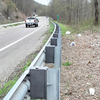Cash relief: Economic help bill advances
 The Virginia Career Works center in Norton is closed to the public for now, but anyone who needs to file an unemployment claim can call 866/832-2363 or go to www.vawc.virginia.gov. For more help, you can call the Norton office at 679-9413 or visit www.vcwsouthwest.org or www.vec.virginia.gov. JEFF LESTER PHOTO
The Virginia Career Works center in Norton is closed to the public for now, but anyone who needs to file an unemployment claim can call 866/832-2363 or go to www.vawc.virginia.gov. For more help, you can call the Norton office at 679-9413 or visit www.vcwsouthwest.org or www.vec.virginia.gov. JEFF LESTER PHOTO
The U.S. Senate has passed legislation aimed at putting cash directly in the hands of Americans who currently cannot go to their jobs, along with providing other direct economic relief, during the COVID-19 coronavirus emergency.
U.S. Sens. Mark Warner and Tim Kaine, D-Va., praised several aspects of the relief package Wednesday.
“This is not the first step Congress has taken to deal with the COVID-19 pandemic, nor will it be the last,” Warner said in a press release.
The House of Representatives is expected to vote on the bill Friday.
According to the senators, provisions of the bill include:
• Direct payments to low- and middle-income households of $1,200 for single tax filers and $2,400 for joint filers, with an extra $500 per minor dependent.
• Expanded unemployment assistance for workers displaced by virus-related restrictions and closures.
• Temporary moratoriums on evictions and mortgage foreclosures.
• $30.75 billion for grants to provide emergency support to public schools and higher education institutions.
• $1 billion for community service block grants to local organizations that provide social services and emergency assistance.
• Nearly $350 billion for forgivable small business loans, to be provided by local banks and usable to cover payroll, rent, mortgage interest, utility bills and more. The amount of loan forgiveness will depend on how many workers a business keeps on the payroll.
• Expanded access to child care.
• $150 billion to support state and local efforts to contain the coronavirus spread and treat patients.
• $150 billion to support hospitals and other health care providers with protective equipment, testing supplies and more.
• Loans to large businesses, with restrictions on stock buybacks and measures designed to keep workers on the payroll.
• $500 million to modernize public health data recordkeeping and infrastructure.
Please support The Coalfield Progress by subscribing today!
You may also like:





